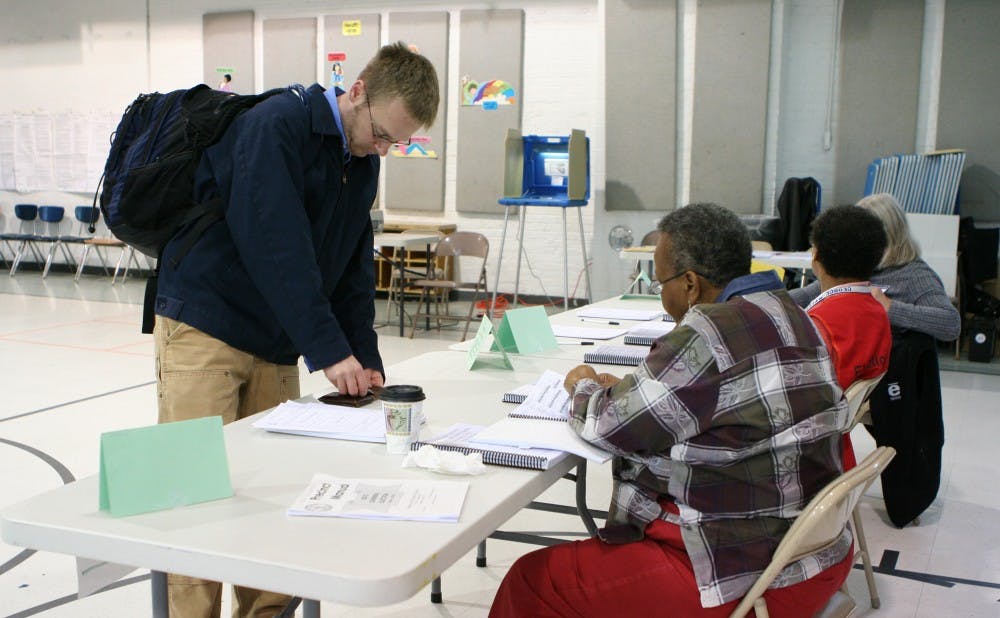Gov. Pat McCrory signed House Bill 589 Aug. 12 of last year to alter voting procedures and restrictions. Among the provisions and restrictions are a reduction of early voting as well as the termination of same-day voter registration, pre-registration for high school students and the use of college identifications as acceptable forms of voter identification.
The law is now the subject of a lawsuit brought against the state by the U.S. Department of Justice. Earlier this month, a comparable law passed March 2012 in Pennsylvania was struck down by a state judge on the basis that it did not assist in free and fair elections. Officials and experts have said that this could have implications for the case developing in North Carolina.
Legally, the Pennsylvania case cannot serve as a legal precedent, as it only involves state law and thus is not applicable in other states, said Guy-Uriel Charles, Charles S. Rhyne professor of law. Judges may be influenced, however, by knowing the actions other courts have already taken on similar constitutional issues.
“The fact that other courts are striking down voter ID laws might make it psychologically possible to do the same in other states,” Charles said. “It certainly is relevant as a moral precedent and other courts might be empowered [to overturn them].”
A lawsuit from the Department of Justice against a voting law in Texas could also predict how events play out in North Carolina, Charles added. Although the states’ respective laws contain different provisions, the states’ situations are analogous to one another.
“People are keeping their eye on what is going on in Texas, because it might foreshadow what is going on in North Carolina,” Charles said.
The Pennsylvania court’s action is a good sign on a moral or philosophical level for those in North Carolina who are fighting to overturn it, said Allison Riggs, a staff attorney at the Southern Coalition for Social Justice and opponent of the law.
“The court will look to what other state courts have done under other constitutional provisions,” she said.
According to the National Conference of State Legislatures, five different states have been involved in legal or legislative action on voter identification since February. In addition to action taken in North Carolina, Texas and Pennsylvania, the Tennessee Supreme Court heard a challenge to a voter ID law and the Arkansas legislature passed and then overrode a veto of a voter photo ID law.
Riggs said differences do exist between the Texas case and the North Carolina one. For example, the Texas law specifies that one’s name must appear exactly the same on the ID and the voting roll, and those without IDs can vote with provisional ballots and return six days later with photo ID.
Additionally, the Texas law is already in effect, whereas most of the North Carolina provisions do not take effect until 2016. For this reason, the Texas lawsuit is “fast-tracked,” Riggs said, and a decision will come in September. The North Carolina case is set to go to trial summer 2015, leaving room for the Texas decision to affect the North Carolina one.
Voters will be asked for a photo ID at polls starting Januart 2014 in a stricter effort by election day workers, but those who do not have one will not be forced to cast a provisional ballot, Riggs said.
A political bargaining chip
As the voter identification saga continues into the 2014 midterm elections, it may be used as more of a point of political contention than one of altered election processes.
Charles noted that because the North Carolina law will not come into direct play in how elections are conducted this year, it might instead become an issue among parties running for seats in the election. The backlash that has resulted from the passage of the law—notably by the state’s chapter of NAACP and its leader Rev. William Barber—will likely put the issue on a platform. Democrats will seek to regain control of the legislature to overturn the law without the help of the courts.
“My guess is the law will be used to work extra hard to turn out the vote,” Charles said.
The state Republican Party has used the law as a point to exemplify differences between their party and opponents such as incumbent Democratic Senator Kay Hagan, who is up for reelection in 2014. North Carolina GOP Communications Director Daniel Keylin expressed in an email Tuesday that the GOP’s perspective remains that the law protects the integrity of the ballot box.
“The Obama administration has filed a frivolous and politically motivated lawsuit against the state of North Carolina, a decision that Kay Hagan has cheered on,” Keylin wrote in an email Tuesday. “North Carolina’s law is common sense policy that is very similar to the laws in over 30 other states…. Only liberals like Kay Hagan don’t think people should have to show a form of photo ID in order to vote.”
Keylin said he does not expect the Pennsylvania ruling to have an effect on developments in North Carolina voting law.
The state Democratic Party is focused less on the pending lawsuits and more on educating people about the logistical impact of the law as it is in place so that people are not prematurely discouraged from turning out at polls, said North Carolina Democratic Party Executive Director Robert Dempsey.
“We know that we need to reach out to our voters,” he said. “We are focused on the law as it stands, talking to voters and making sure they understand it.”
Get The Chronicle straight to your inbox
Signup for our weekly newsletter. Cancel at any time.

